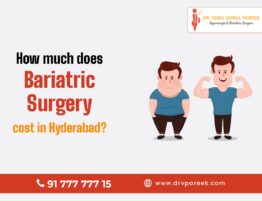
If you are overweight, surgery for obesity may be an option for you. Obesity surgery is also referred to as bariatric surgery. As an obesity patient, if you are looking for weight loss with surgery, the first question that arises is which procedure is best for me. A conclusion about this must be reached after a thorough examination of the risks and benefits of each method. Determination of individual patient’s post surgery risk must be evaluated.
A doctor can recommend surgery if you have a Body Mass Index (BMI) of more than 40. A BMI of more than 40 usually means you are overweight over 100 pounds. One of the more recent options for bariatric surgery is a laparoscopic sleeve gastrectomy (LSG).
About 60 percent of bariatric operations in India are laparoscopic sleeve gastrectomy. The remaining 40 percent consists of procedures such as adjustable gastric band done laparoscopically or Gastric Bypass. Laparoscopic sleeve gastrectomy (LSG), which is relatively new in bariatric surgery, is increasing popularity. So, in this article provided by Dr Venu Gopal Pareek gives you the information about the sleeve gastronomy procedure and outcomes.
What is the Sleeve Gastrectomy?

A Sleeve Gastrectomy is a surgical procedure that reduces the size of the stomach permanently to help you lose weight and maintain weight loss. The surgeon divides and seals all the blood vessels that supply the stomach that has been removed. The stomach is then stapled surgically and sealed using a calibration guide tube to measure the size of the stomach tube left behind, permanently removing about four-fifths of the stomach.
It is known as a restrictive surgery, which means that the amount of food/drink that your stomach can absorb is smaller after surgery. For example, the stomach can usually take up to 1500 ml, but this reduces to less than 200 ml .
How Sleeve Gastrectomy Causes Weight Loss?

Sleeve gastrectomy is a restrictive procedure. It significantly reduces the size of the stomach and limits the amount of food that can be eaten, but does not cause reduced nutritional intake or bypasses the intestine. After this operation, the patient feels full after eating very little. It can also create a loss of appetite.
Besides reducing the size of the stomach, It also reduces the amount of hunger hormone called ghrelin of the stomach. The duration of this effect is unclear, but the majority of patients significantly reduce hunger after surgery.
Sleeve Gastrectomy Procedure:

Sleeve gastrectomy is performed in a hospital. Depending on your recovery, hospitalization may take one to two nights.
Before The Procedure:

Before you go to the operating room, you change your clothes and are asked several questions by doctors and nurses about your general health. Before starting the surgery, general anaesthesia is given in the operating room. Anaesthesia is a drug that puts you to sleep during surgery.
During The Procedure:

The specifics of the surgery depend on a personal situation and the practice of the hospital or doctor. Some sleeve gastrectomy performed with a large traditional (open) incision in the abdomen. However, this procedure is usually performed laparoscopically, with a small instrument guided through several small incisions in the upper abdomen.
The surgeon then makes a narrow sleeve by stapling the stomach vertically and remove the more significant and curved part of the stomach. Usually, surgery requires one to two hours. After surgery, you will wake up in the recovery room where medical staff will monitor you for complications.
This process works through several mechanisms. First, a new stomach pouch has a much smaller volume than a healthy stomach and helps reduce the amount of food (and therefore calories) that can consume significantly. However, the effects of surgery on intestinal hormones, which affect several factors such as hunger, satiety and blood sugar control, appear to have a more significant impact.
Short-term studies show that sleeve gastrectomy is as effective as Roux-en-Y gastric bypass in weight loss and diabetes repair or remission. There is also evidence that sleeve gastrectomy is effective in improving type 2 diabetes, regardless of weight loss.
Post Surgical Procedure

After sleeve gastrectomy, the diet will begin with non-sugar non-carbonated liquid for the first seven days, then with pureed food for three weeks and then with regular food about four weeks after surgery. You should take a multivitamin twice a day, calcium supplements once a day and vitamin B-12 injections once a month depending on nutritional status.
In the first few months after weight loss, you will be regularly checked by a doctor to monitor your health. You may need laboratory tests, blood tests and various examinations.
You may notice changes when your body responds to rapid weight loss in the first three to six months after a sleeve gastrectomy, that are common, including:
- Body aches
- Feeling tired, as if you have the flu
- Feeling cold
- Dry skin
- Hair thinning and hair loss
- Mood changes
Outcomes:

- The most notable results and measures Excessive weight loss is associated with comorbid obesity and partial and complete remission after 1, 3 and 5 years of follow-up.
- Sleeve gastrectomy can cause long term weight loss. The amount of weight loss depends on your lifestyle changes. You may lose about 60 percent or even more of your excess weight in two years.
- In addition to weight loss, sleeve gastrectomy can improve or solve conditions associated with obesity, including:
- Heart disease
- High blood pressure
- High cholesterol
- Obstructive sleep apnea
- Type 2 diabetes
- Stroke
- Infertility
- Sleeve gastrectomy can enhance your ability to do your daily routine and can help improve your quality of life.
Conclusion:
LSG makes effective weight loss and a significant improvement in obesity-related comorbidities, uniquely correlated with excess weight loss. There was a considerable increase in body weight and a reduction in the rate of diabetes remission and, to a lesser extent, other comorbidities over time.
A surgeon can talk to you about LSG if you have a BMI of more than 60 or have serious medical problems that increase the risk of anaesthesia and sleeve gastrectomy. You should discuss all available surgical procedures with a surgeon and determine which method is best for you before making a decision.
Finally, LSG is a safe and effective treatment that results in significant weight loss for one year when offered as a one-step procedure, especially for patients with a BMI of less than 50 kg / m. For more information about the surgery and to know that you are the right candidate for the surgery contact Dr Venu Gopal Pareek at +91 91-777-77715 and book your appointment at https://www.drvpareek.com/contact-us/
About the Doctor:
Dr Venugopal Pareek – Bariatric Surgeon

Dr Venugopal Pareek is one of the best Laparoscopic and Bariatric Surgeon in the city has done more than 9000 surgeries in 12 years. Dr Pareek has the expertise in Bariatric Surgery. He has attended several conferences and published articles on medicine as well in various national and international journals.







